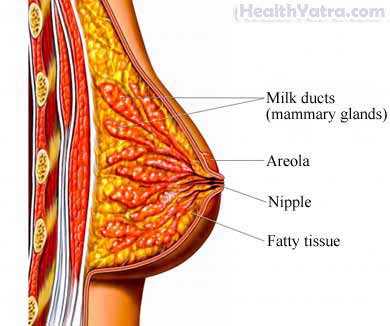Definition
Galactorrhea is a discharge of milk-like substance from the breast that is not associated with breastfeeding after pregnancy. This condition mainly occurs in women. It does occur in men, but much less commonly. The milky white discharge can come from one or both breasts, and the breast may leak fluid with or without stimulation.

Causes
Galactorrhea has many causes, though sometimes the cause is unknown. Tumors of the pituitary gland, called pituitary adenomas or prolactinomas, can cause galactorrhea. The pituitary is a small gland attached to the brain. Pituitary tumors are usually not cancerous. They can cause galactorrhea when they produce excess prolactin, a hormone that stimulates milk production.
Other causes of galactorrhea include:
- Hormonal imbalance, such as hypothyroidism
- Some medicines, such as:
- Stopping or starting to take birth control pills or other hormones
- Blood pressure drugs
- Tricyclic antidepressants
- Tranquilizers
- Antinausea drugs
- Some antigastroesophageal reflux medicines
- Some pain killers
- Certain herbs, including:
- Nettle
- Fennel
- Blessed thistle
- Anise
- Fenugreek seed
- Illicit drugs, such as:
- Marijuana
- Opiates
- Sexual stimulation of the breast
- Certain diseases, including:
- Hypothyroidism (underactive thyroid) or hyperthyroidism (overactive thyroid)
- Chronic kidney failure
- Chronic liver disease (cirrhosis)
- Sarcoidosis
- Chronic emotional stress
- Hypothalamic tumors or disease (such as tuberculosis)
- Chest wall conditions, such as:
- Shingles
- Trauma
- Burns
- Surgical scars
- Tumors of chest wall
- In newborns, high levels of circulating hormones (estrogen) may result in enlarged breast tissue and secretion of milk.
Risk Factors
Factors that may increase your chance of galactorrhea include:
- Sex: female
- Stress
- Wearing clothing that irritates the nipple, such as:
- Wool
- Tight-fitting bra
- Frequent (daily) breast self-exam or frequent breast stimulation
Symptoms
The primary symptom is a milky discharge from the nipple that is not associated with breast-feeding. The discharge can come from one or both breasts. Other symptoms that can occur along with the discharge include:
- Abnormal or absent menstruation
- Heat or cold intolerance
- Disordered appetite, increase or decrease in weight
- Increased thirst or urination
- Loss of sex drive
- Bloody or foul-smelling discharge
- Headaches
- Acne or abnormal hair growth
- Visual difficulties
- Impotence (men only)
Diagnosis
The doctor will ask about your symptoms and medical history. A physical exam will be done. Tests may include:
- A sample of the breast discharge to look at under a microscope
- Blood tests to check hormone levels
- Pregnancy test
- Imaging tests to check for a pituitary gland tumor in the brain:
- MRI scan—a test that uses magnetic waves to make pictures of the inside of the body
- CT scan—a type of x-ray that uses a computer to make pictures of the inside of the body, which may not be sensitive enough to pick up subtle findings
If the discharge is not milky or contains blood, then this is not galactorrhea. Other tests must be done to check for breast cancer or other disorders.
Treatment
Treatment depends on the cause. In some mild cases, no medical treatment is necessary, and the condition will go away on its own. In these cases, breast binders that prevent stimulation of the nipples may be effective. If medications are identified as the potential cause, safe alternatives should be sought.
If an underlying cause for galactorrhea, such as a pituitary tumor, is found, this condition may be treated.
Pituitary tumor treatment—Tumors of the pituitary gland that cause galactorrhea are usually benign. Small tumors may be treated with a medicine, such as bromocriptine. Larger tumors may be treated with the following:
- Surgery—surgical removal of the tumor and nearby tissues, considered when medicines fail
- Radiation Therapy (or radiotherapy)—the use of radiation to shrink tumors. considered when medicines and surgery fail
Despite treatment, pituitary gland tumors often recur.
Prevention
To decrease the risk of galactorrhea:
- Avoid wearing clothing that irritates the breast.
- Avoid frequent breast self-exam; usually once a month is enough.
- Avoid excessive sexual stimulation of the breasts.
- Do not use illicit drugs.
Galactorrhea Treatment in India Page Keywords:
Galactorrhea Definition, Definition Causes, Galactorrhea Symptoms, Galactorrhea Treatment in India, Galactorrhea Treatment Cost in India, Galactorrhea Surgery Cost, Top Galactorrhea Treatment Hospital, Top Galactorrhea Treatment Doctor in India, Galactorrhea Meaning in Marathi, Galactorrhea Treatment Near me, Galactorrhea Complications, Travel India for Galactorrhea Treatment, Galactorrhea Treatment in Arab Countries, Galactorrhea Treatment in Bangladesh, Galactorrhea Treatment in Dhaka, Galactorrhea Meaning in Bengali, Galactorrhea Meaning in Arabic, Galactorrhea Meaning in Hindi, Galactorrhea Treatment in Bahrain, Galactorrhea Treatment in Egypt, Galactorrhea Treatment in Iraq, Galactorrhea Treatment in Jordan, Galactorrhea Treatment in Kuwait, Galactorrhea Treatment in Lebanon, Galactorrhea Treatment in Saudi Arabia, Galactorrhea Treatment in United Arab Emirates, Galactorrhea Treatment in Sudan, Galactorrhea Treatment in Tunisia, Galactorrhea Treatment in Nepal, Galactorrhea Treatment in Nepal,
Galactorrhea Meaning in Bengali-Galactorrhea Meaning in Arabic-Galactorrhea Meaning in Hindi-Galactorrhea Meaning in Marathi
